#intertexuality
Note
do you have or could you make a webweave about nostalgia? specifically of the yearning and grieving variety. it's killing me that all of it is gone forever, that all that remains is an echo, and that it will only keep fading. big yikes.





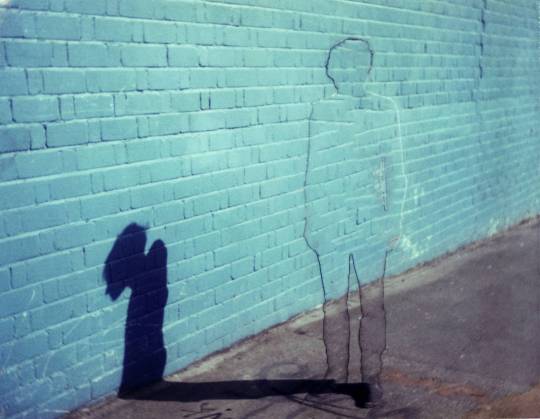


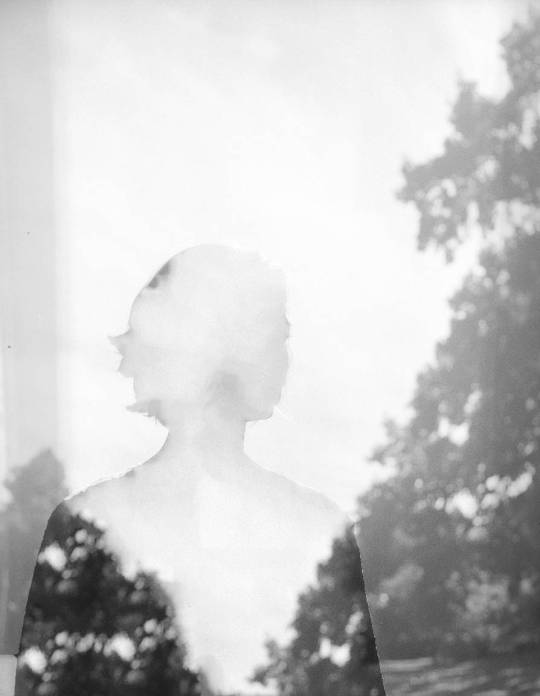

@robertszombie \\ jordanna kalman \\ jordanna kalman \\ @wearemadeofstardust0 \\ david foster wallace \\ jordanna kalman \\ okechukwu nzelu here again now \\ jordanna kalman \\ jordanna kalman \\ jordanna kalman
kofi
#asks#anonymous#webweaving#mine#my webweaving#web weave#webweave#web weaving#intertextuality#webs#parallels#compilations#web#ww#parallel#parallelism#compilation#intertext#intertexuality#comparative#comparatives#robertszombie#on loneliness#on nostalgia#on life#on yearning#on grief#jordanna kalman#wearemadeofstardust0#david foster wallace
2K notes
·
View notes
Text



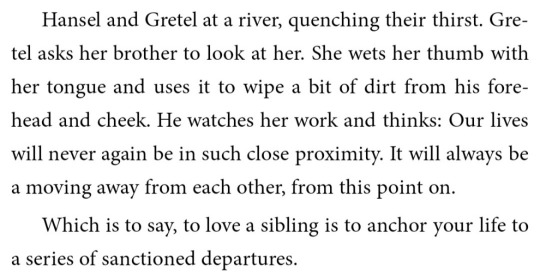
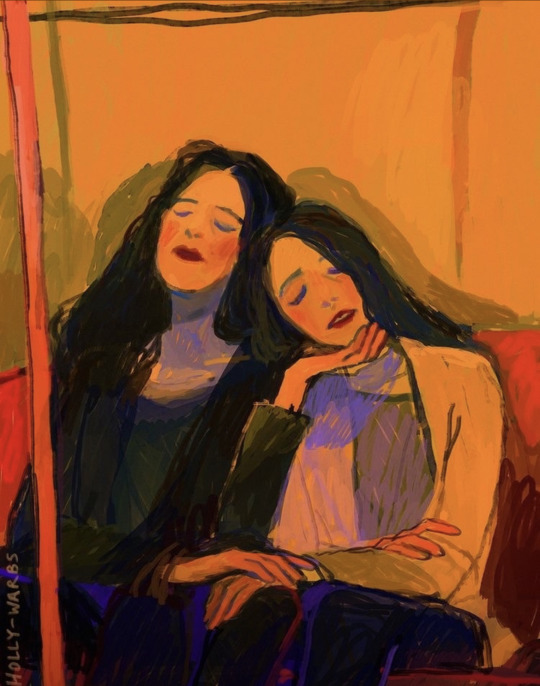

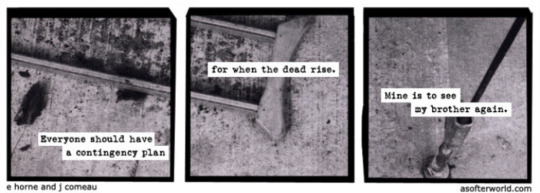
This is my brother, and I need a shovel to love him
Steven Berkoff, The Fall of the House of Usher / Anne Carson, Antigonick / @taohun / Lindsey Drager, The Archive of Alternative Endings / Holly Warburton, Sisters / Jean Anouilh, Antigone (trans. Lewis Galantiere) / Zadie Smith, On Beauty / Emily Horne and Joey Comeau, A Softer World
#why yes I have watched succession recently#web weaving#web weave#words#compilations#parallels#parallelism#intertexuality#poetry#art#on siblings#family#mine
729 notes
·
View notes
Text
this is so funny i might throw up laughing

9 notes
·
View notes
Photo


utopic plagiarism, hypertextuality, and electronic cultural production by the critical art ensemble, 1994
5 notes
·
View notes
Text
i can tell im finally drunk instead of tipsy bc i wont shut up aboutn how much i love bela lugosi
2 notes
·
View notes
Text
Watching Jacob Geller’s video Fear of Cold reminding me that sometimes English class sucks any appreciation of reading out of me when not enough time is spent on the general meaning of stories than over-analyzing them through the lens of rhetorical and literature devices.
#katantalks#i like totally forgot we read To Build A Fire when I was a junior#and like I never appreciated the story in any meaningful way#because we never had discussions about the cold properly#it was more about the rhetorical devices used than anything else#idk like the video did such a good job of weaving intertexuality into an interesting discussion about how cold is presented in real life and#fiction#like if that was the kind of discussion we had#how much more would i have been able to appreciate the story for what it is#?#fuck my AP lit class honestly
2 notes
·
View notes
Text
i fucking love so MUCH when the research process naturally builds on itself... i had an idea to discuss both "heteroglossia" and "intertexuality" in context of my thesis and girl guess WHAT.... heteroglossia was proposed in the 1930s and intertextuality was developed in the 1960s and DIRECTLY DRAWS from heteroglossia..... oh my god... kisses my research angel on the mouth
#i LOVE..........when these things get revealed#every fckng light in my brain gets switched on#like YEAH it seems obvious since theyre very related concepts but to know that the person who coined intertexuality#did it literally DIRECTLY in response to heteroglossia... i dont know how to articulate how cool this is#grad schoolin
0 notes
Text
We need to bring back fanfics where the author talks to the characters in the chapter notes and occasional intertexual asides, and through this medium the reader gradually becomes aware of a whole secondary metanarrative concerning the interpersonal dramas of the notional "actors" playing the characters in the fic.
3K notes
·
View notes
Text
Kaito, Aoi, and the Importance of Digimon Survive's Intertexuality Across Routes
Digimon Survive is such a powerful narrative because its core theme is reinforced through its very structure as a visual novel. The game's radical belief in the ability for anyone to blossom into the best versions of themselves given the right circumstances is a powerful concept, but it could easily come off as naive. To avoid coming off as naive, there must be an acknowledgement of the darkest parts of our hearts.
It's like this:
In the Truthful Ending, Kaito has some issues with anger and overprotectiveness, but ultimately develops a slightly healthier relationship with his sister. A fine snapshot of a young boy's life over the course of a few weeks, but is it a snapshot of the young boy's soul? I think not. That snapshot comes in more parts. To see how his relationship with Miu would develop in more dire circumstances, you must see Moral Route. To see how he would cultivate a more strenuous relationship with Miu in light of a heightened sense of danger in the world, you must see Wrathful Route. To see who Kaito would become without Miu's grounding presence, you must see Harmony Route.
By seeing Kaito across four dimensions, you are able to form a picture of the actual Kaito. In composite, Kaito is obviously a good person. He is motivated by a desire to protect. He is brave. He cares for people. Even his friends who he betrayed in Harmony Route could see that deep down, Kaito had the potential to be a good person. This is seen when they all wish to extend an offer of forgiveness to Kaito, even after he resolved to destroy the world. By seeing Kaito at his absolute worst, we actually see a glimmer of his potential.
(I would like to clarify that I do not believe that Kaito "redeemed himself by dying," nor is it my reading of the text that Kaito was made to die as punishment for his misdeeds. I understand how one may come to those readings of the text, but I believe it was an unfortunate and unintended implication at worst.)
Aoi is an overachiever. She's a bright young girl, and that comes with certain expectations. If one were to look at her on a very surface level, you would think that she understands the importance of the responsibilities she's been given, and she doesn't mind the extra work. That is obviously bullshit, but to some extent, this is the image she puts out into the world. Aoi is not forthcoming about her emotions, so prior to meeting Labramon, she allows herself to stoically accept an unfair burden. Her fellow students take advantage of her, and her opinion is rarely respected among the other chosen children when discussing next steps. Without the ability to assert herself, she has all of the responsibility with none of the actual power. She must work hard, but she cannot do good.
This is a shame. Aoi is motivated by a strong sense of justice. The best version of herself is one who has the confidence to set boundaries and stand firm on issues she cares about, but much like Kaito, watching her grow into her best self is merely a snapshot of a few weeks in the life of a child. To truly plunder the depths of Aoi's soul, we must look into Wrathful Route.
In Wrathful Route, we see the most explosive expression of Aoi's convictions. She learns that a sense of justice is worth nothing if you don't have power, and power is worthless if it is not used. While nobody younger than Aoi dies in Moral Route, and Miu's safety in Harmony Route is Kaito's responsibility first and foremost, Saki's safety was squarely Aoi's responsibility.
Aoi's grief over her own failure to uphold her values causes an overcorrection. She is overcome with a desire to wield the maximum possible power and realize a twisted vision of maximum possible justice.
I love the gusto, Aoi, but human instrumentality is not a healthy response to traumatic invalidation.
It's important to stress that while I love Saki and think Saki/Aoi is an adorable ship, Saki's death is not the sole cause of Aoi's mental anguish. Saki's death was the catalyst for Aoi to close herself off from the community who could have helped her. The anguish began developing years prior.
In other routes, Aoi's relationship to her sense of justice, her responsibility, and her assertiveness develop in different ways, but by examining Aoi across four dimensions, we can understand Aoi's actual self. In composite, Aoi is a good person. She has strong convictions. She is protective. She is capable. There are a lot of ways these values can shape a young girl, and Aoi deserves a life where she has a supportive community to allow her to grow into the best version of herself. Don't we all?
At the core of both Kaito and Aoi, we find good people. I like to think you'd find the same at the core of everyone in real life, too. And yet, in real life, we obviously find people who do work to make the world a worse place. In Digimon Survive, we can see the paths not taken, for better and for worse. In doing so, we see the Truth of each character.
(This is not wholly unrelated to the appeal of "the Digimon as a reflection of the human partner's true self." In Dracmon, we see Kaito's protectiveness in a more trusting and easygoing package. In Labramon, we see Aoi's supportiveness in a more assertive package.)
#digimon survive#digimon survive meta#aoi shibuya#shibuya aoi#digimon survive week#but late#day 2 cooperation#very late okay?#hi maq
42 notes
·
View notes
Text
William Blake and Good Omens - an intertextual analysis
Please note: I did another version of this and posted it, but it was quite hurried, way too short, and was incorrect in a number of ways so I deleted it. However it had already been reblogged by the time i did so. If you happen to see another version of this meta that's not the right one, this is the version I'm happy with!
After my previous post re William Blake and Good Omens did so well, and so many people showed an interest I've decided to do a more in depth piece. This is focused upon the TV version of Good Omens, not the book.
Please don't tag Neil in this - although it's mostly textual analysis I do a very small amount of S3 theorising, and I know he doesn't want to see that.
I am in no way suggesting that Neil and Terry specifically wrote Good Omens with Blake in mind, I honestly just wanted an excuse to write more about Blake because I love his work so much, and I thought it would be interesting to try and apply some intertexuality since the works will contain similar themes, both being about God, religion, humanity, and angels and demons.
I also should stress that I am not an expert on Blake, there are people far more qualified to comment on him than I. I'm just a former literature student who loves his work.
There have been many different interpretations of Blake's work over the years, so it's completely fine to disagree with someone else's ideas about it, as with any work of art or literature. And although this piece is likely to be long, I'll barely be able to scratch the surface of all the possible meanings that could be ascribed to it.
Much like the old adage that if someone claims to understand quantum physics they're lying, I'm not sure anyone can truly fathom the full meaning of Blake's philosophy (especially in his later prophetic works, fuuuuuuck those beasts....), so if you're confused by him don't be discouraged, that's perfectly normal!
That being said, I wish to discuss the parallels between Good Omens and The Marriage of Heaven and Hell, my personal favourite and probably the most accessible of his longer works.
"Without contraries is no progression. Attraction and Repulsion, Reason and Energy, Love and Hate, are necessary to Human existence.
From these contraries spring what the religious call Good & Evil. Good is the passive that obeys Reason. Evil is the active springing from Energy.
Good is Heaven. Evil is Hell."
This excerpt is from near the opening and sets out the central idea of the work - that there is an essential duality to humanity, and each person is a combination of extremes. These extremes are not at war with each other, but rather are equally necessary, hence the "marriage" of the title. "The Marriage of Heaven and Hell" is a metaphor for the human experience.
Consistently throughout The Marriage... Blake refers to the two extremes as Reason and Energy. These terms could be construed in a number of different ways: thought versus emotion, mental versus physical, restraint versus desire, temperance versus excess, caution versus impulsiveness, and following the rules versus free will.
Blake's use of the word "Reason" in this context may be somewhat confusing, however he likely chose it because of his negative feelings towards science and the Age of Enlightenment. Blake saw literal visions of angels and prophets and the divinity of all creation, and hated that science reduced everything to formulas, calculations, and materialism, leaving the world bereft of wonder. "Art is the Tree of Life. Science is the Tree of Death" as he put it.
His ideas about "reason" are best expressed by his painting "Newton". Though inspired by the scientist, it is not a portrait - instead it depicts a figure deeply engrossed in scientific drawings and calculations, totally ignoring the beauty all around him - see below.
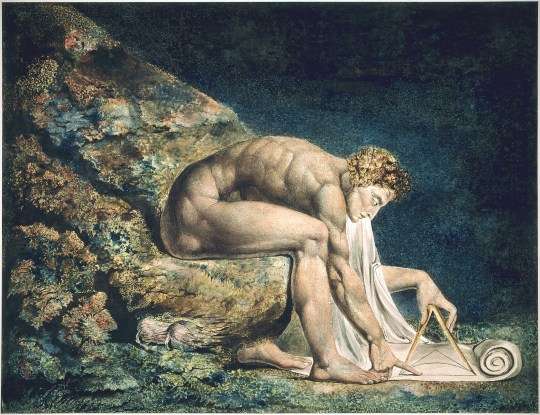
In the context of The Marriage... Reason is "passive" because it involves thought, caution, self-restraint, and doing what you are told, all states which block action. Energy is "active" because it is physical, emotional, impulsive and allows you to act based on your own choices and desires. It's quite clear that Blake feels "energy" is the preferable state - he tells us as much in the next section:
"The Voice of the Devil
All Bibles or sacred codes, have been the causes of the following Errors.
1. That Man has two real existing principles Viz: a Body & a Soul.
2. That Energy, call'd Evil, is alone from the Body, & that Reason, call'd Good, is alone from the Soul.
3. That God will torment Man in Eternity for following his Energies.
But the following Contraries to these are True.
1. Man has no Body distinct from his Soul; for that call'd Body is a portion of Soul discern'd by the five Senses, the chief inlets of Soul in this age.
2. Energy is the only life and is from the Body and Reason is the bound or outward circumference of Energy.
3. Energy is Eternal Delight."
So the body is an aspect of the soul, not separate from it, Energy comes from the body, it is Reason which places limits upon Energy, but Energy is eternal delight. Physicality, desire, impulsiveness, emotion, sensual pleasure and free will are not wrong or evil, they are aspects of the human soul and it is from them that we derive our enjoyment of life.
This does not necessarily mean that Reason is always bad. After all, Blake tells us that both are necessary for human existence. Sometimes temperance, caution and thought before action are required. But Reason becomes negative when it "usurps its place and governs the unwilling", i.e. when it completely supplants Energy and becomes the sole guiding factor, forcing passivity.
The Angels of The Marriage... are governed by "systematic reasoning", therefore they are wholly creatures of Reason. They are also "all religious" meaning they believe the "errors" stated above. His Devils by contrast "hate religion" meaning they believe the "contraries", which are the true statements according to Blake. It does not necessarily follow that they are wholly governed by Energy, merely that they believe Energy is "eternal delight".
It is worth noting at this point that Blake saw God and religion as totally separate. For Blake, "God" is that connection with divine wonder which was integral to his life; he tells us plainly that "all deities reside in the human breast" and that "the voice of honest indignation is the voice of God". In other words all humans have a direct and intuitive link with God and don't require the church, Priests, or a religious framework and adherence to a set of rules in order to reach moral decisions. These rules exist only to "enslave the vulgar".
The importance of this ability to make one's own choices about a moral course of action is shown by one of the "Memorable Fancy" sections of The Marriage...
Blake relates how a Devil is able to use an Angel's "systematic reasoning" against them:
"if Jesus Christ is the greatest man, you ought to love him in the greatest degree; now hear how he has given his sanction to the law of ten commandments: did he not mock at the sabbath, and so mock the sabbaths God? Murder those who were murder'd because of him? Turn away the law from the woman taken in adultery? Steal the labor of others to support him? Bear false witness when he omitted making a defence before Pilate? Covet when he pray'd for his disciples, and when he bid them shake off the dust of their feet against such as refused to lodge them? I tell you, no virtue can exist without breaking these ten commandments; Jesus was all virtue, and acted from impulse, not from rules."
The Angel has no way to refute the "reasoning" that Jesus was governed by Energy and "impulse", i.e. his own morality, the "voice of righteous indignation", not reasoning and the rules laid down by Heaven. And because Jesus is the Messiah he must be virtuous, therefore Energy is virtuous. The Angel immediately allows himself to be consumed by fire and is resurrected as a Devil.
How can these concepts apply to the world of Good Omens? This was where my first draft was totally incorrect, as I tried to transfer Blake's ideas about Angels and Demons and Heaven and Hell wholesale, applying "reason" to Aziraphale and Heaven and "energy" to Crowley and Hell. In fact the divide is slightly different in the GO-verse: Crowley and Aziraphale *both* represent Energy, and it is Heaven and Hell that act according to Reason.
At first glance Aziraphale may appear to toe the line - he needs creative application of the rules to make him comfortable with trying to avert the apocalypse, and when he doesn't like the way matters are being handled by the Archangels he seeks a higher authority and goes straight to God. He'd clearly prefer someone to be confirming the rightness of his actions for him. However this doesn't mean that he won't act on his own.
Immediately upon his introduction to the story he has given away his flaming sword, an action that he took impulsively because he felt it was right, not because someone told him to. It bothers him, but he does it anyway.
In the Job storyline, though he initially looks for some loophole within the rules that will allow him to save Job's children, in the end he directly goes against Heaven to do it, even though he believes he is going to Fall and become a Demon for having done so.
Though he resists it and exhausts all other possible avenues first, he eventually does take an active role in averting the apocalypse in S1.
He hides Jim at great personal risk to himself and against the will of both Heaven and Hell, again because he feels it is the right thing to do.
He is therefore perfectly capable of independent action from a position of "righteous indignation".
On a more basic level, he enjoys worldly pleasures, which all come from "energy" according to Blake's philosophy. Food and drink most obviously, but also books, music, dancing, theatre, art and so on.
Crowley is more easy to place as acting from Energy - in spite of the obvious aesthetic differences between them, he also loves worldly pleasures. Alcohol and coffee, snazzy clothing, driving his car with Queen blaring on the stereo, going to lunch with Aziraphale, Shakespearean comedies. All things he isn't supposed to want or need, and which baffle other Demons, in the same way that Aziraphale's desire for food baffles the Angels.
And he's absolutely willing to act according to his own moral impulses when they conflict with Hell's orders (or Heaven's), be it saving Job's children, ensuring that Elspeth doesn't die by suicide, or averting the apocalypse. Yes, he'll try to hide his "good" actions in order to avoid punishment by Hell, but he's firmly "on his own side".
Conversely, Heaven and Hell are both part of the structure of religion in this story, are strictly adherent to a set of rules, and their inhabitants appear to have no real desires of their own, other than possible advancement within the systems they uphold. They are "passive" in that their functions allow the status quo to continue and the "great plan" to unfold as they believe it is meant to, even though each side expects a different outcome.
Again, applying Blake's philosophy, I would say the reason for this is that "energy is from the body". Crowley and Aziraphale have both been given bodies in order that they can exist on earth, and *have* existed on earth for 6000 years, therefore "energy" - physical pleasures and free thinking - have become a part of who they are.
On a more fundamental level, possession of a body can be equated to humanity, and humanity has been shown as the most powerful force of all in this story, its influence having led to Adam becoming "human incarnate", and thus acting according to what he feels is right, instead of fulfilling the function he was destined for.
Heaven and Hell contain no material objects, and the Angels and Demons are spiritual beings, having no bodies, so they are not open to energy, and therefore are wholly governed by Reason, and the preservation of the religious structures within which they exist. Structures which, as for Blake, may not actually have anything to do with God herself. In S1 she is a distant observer, clearly aware through her narration of all that is going on, but not interceding in any way. In S2 she is barely present save for her voice being heard briefly in Job, and overlaid with Gabriel's on two occasions.
Bearing all this in mind, what predictions can we make regarding S3 by applying Blake's philosophy?
"The ancient tradition that the world will be consumed in fire at the end of six thousand years is true, as I have heard from Hell.
For the cherub with his flaming sword is hereby commanded to leave his guard at [the] tree of life, and when he does, the whole creation will be consumed and appear infinite and holy, whereas it now appears finite and corrupt.
This will come to pass by an improvement of sensual enjoyment."
The parallels of the cherub with his flaming sword, and the passage of 6000 years should be obvious to anyone reading this - they have of course been lifted directly from the Bible as they are in GO.
I have read some metas which speculated that Aziraphale's bookshop, or perhaps Earth itself, is a metaphorical stand-in for Eden or The Tree of Life. Aziraphale has been commanded to leave his "Eden" and will now be instrumental in causing the whole of creation to become infinite and holy, but Blake tells us this will be done by an improvement of sensual enjoyment, which arises from Energy not Reason.
Sensual enjoyment is something which is intrinsic to Aziraphale's character, and this could make his placement in Heaven very important.
Putting aside all the "final fifteen" theories and taking matters at face value, Aziraphale tells us that if he's in charge he can make a difference - he needs to subvert the system from the inside out. The most subversive thing of all could be that a sensualist who acts according to "the voice of moral indignation" and "Energy" has become the supreme Archangel. We have seen in Blake how a realisation that Energy could be virtuous was enough to convert an Angel into a Devil (incidentally, does the image of an Angel being consumed by fire and emerging as a Devil seem familiar at all...)
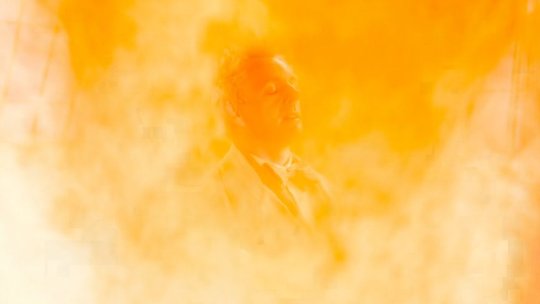
We may have seen the beginnings of this already. Gabriel and Beelzebub became open to Energy from such little things as visiting earth, spending time in one another's company, and their mutual enjoyment of a song, which has given them wants and desires beyond those dictated by Heaven and Hell. This is enough to make them wish to leave their roles behind.
It's possible that the same may happen with Muriel. They haven't yet imbibed food or drink, but they have shown an enjoyment of books, which are an earthly pleasure, and open the reader up to new ideas and ways of thinking.
Of course, this would lead to questions regarding the Metatron's statement that he has "ingested things", and whether this means he is acting from reason or energy. Of course the simplest explanation is that it is a manipulation tactic, and he is lying about having done so, but if true that statement has some interesting implications. However, this is now super-long and I'm out of juice, so will leave others to speculate. I may return to this in the future!
There we go, hope you enjoyed. I doubt this will reach nearly as many people as my first Blake post, but if a few find it of interest then my work is done!
#good omens#good omens 2#go2#crowley#aziraphale#good omens tv#good omens meta#good omens s2#good omens season 3#good omens s3#good omens brainrot#william blake#the marriage of heaven and hell#poetry#poems and poetry#books and reading#english literature#Textual analysis#intertextuality#good omens theories#good omens thoughts
44 notes
·
View notes
Text
Anyhow it's always shocking to me how readily those who are utterly ignorant of music feel moved to share their opinions on it or judge the tastes of others. If you didn't know what contraposto or foreshortening was, you wouldn't feel comfortable voicing your opinion on visual art, would you? If you didn't know anything about mise-en-scène or the 180-degree rule, you wouldn't feel comfortable judging a director's filmmaking technique, would you? If you knew nothing of allegory, metonymy, intertexuality, if you'd read none of the great works of the literary canon, would you really feel comfortable judging a writer's prose? What emboldens so many people who don't know what a perfect cadence or an apoggiatura are to speak so confidently about what music is and isn't good? The entitlement is astounding to me.
17 notes
·
View notes
Text
Eating the media isn't enough I need to study and report on the intertexuality between it and other favourite media of mine.
9 notes
·
View notes
Text



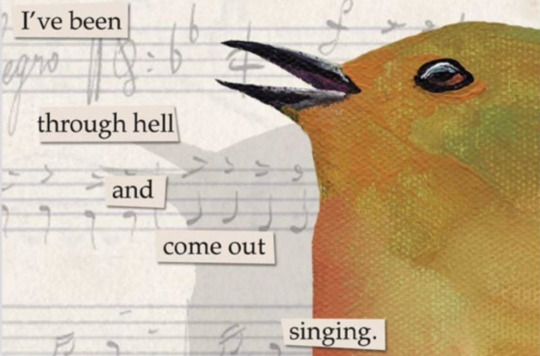
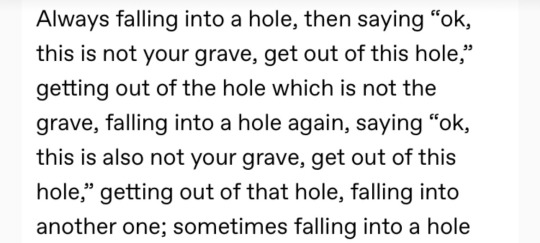





Yes, there will be singing / about the dark times
#reminders for the winter#web weaving#web weave#words#compilations#parallels#parallelism#poetry#intertexuality#art#mine
580 notes
·
View notes
Text
The fact that I get the approval from my professor to write my next 17 page essay, on the intertexual references to Dante in Hoziers unreal unearth the day before the new ep releases is just SCRUMPTIOUS
6 notes
·
View notes
Note
Love your meta- I wanted to ask if you think the show used primarily heterosexual references because that was the norm of the culture at the time? It stuck out that for a show about a queer character all the intertexual nods are hetero.
<3 Thank you. I think it was incredibly deliberate and the show pointing really hard at what it was trying to say (yet people missing the point so maybe they should've pointed harder???). Its not like there was no gay or lesbian literature around in the show's time period. If they wanted to, they could've easily had Louis read Thomas Mann or Marcel Proust or Oscar Wilde instead of Madame Bovary and going to see A Doll's House. Christopher Isherwood's most famous works were being published in the 1930s. The Children's Hour (the play) is from 1934. Also the work doesn't have to be published yet in the show's era to be used as a reference. Streetcar wasn't performed until 1947 but that's like the in your face reference the show makes.
#asks#stefan zweig's confusion would've been a really appropriate queer novel for louis to read actually#i think from 1927
7 notes
·
View notes
Note
caitlin hii how are you? i have a very random question, i heard andor is very good but i'm not really a star wars fan, do you think i'd still be able to enjoy it as its own thing? (i did watch rogue one btw but i've heard people talk about how good andor is and i'm curious)
oh my gosh, doron, hi!! i'm doing well, how are you?? ❤️
i definitely think as long as you've watched rogue one, you'll be able to follow andor no problem! (it's a prequel, of course, but it does have some intertexuality with that movie specifically that i think maximizes your appreciation of it.) those two things really do stand alone from the rest of the star wars saga in a lot of ways — and apart from cassian and mon mothma, andor is mostly about a set of entirely new characters that are introduced within the series itself.
highly recommend it; it's a really great story about standing up against fascism through community action that definitely shines through, even if you're not much of a star wars fan! it was literally my favorite show that came out in 2022.
#asks#tedlass#and like i am a huge star wars fan and i have loved cassian andor for years so like. of course i was primed to love it.#i'm the target audience ghfjdksfjsk#but i think it's SUCH a good story that stands on its own and i'd highly rec watching it <3
11 notes
·
View notes